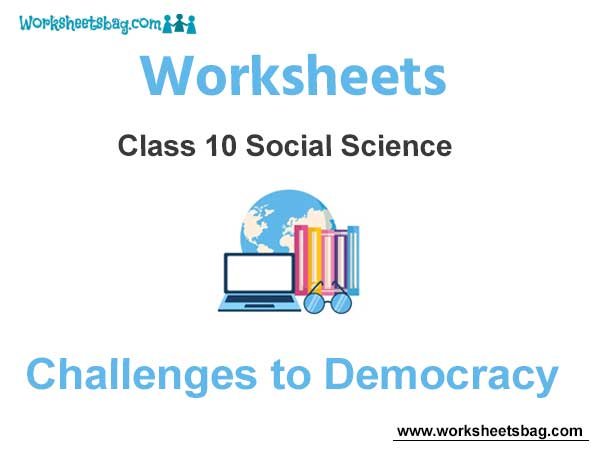Students should refer to Worksheets Class 10 Social Science Challenges to Democracy Chapter 8 provided below with important questions and answers. These important questions with solutions for Chapter 8 Challenges to Democracy have been prepared by expert teachers for Class 10 Social Science based on the expected pattern of questions in the class 10 exams. We have provided Worksheets for Class 10 Social Science for all chapters on our website. You should carefully learn all the important examinations questions provided below as they will help you to get better marks in your class tests and exams.
Challenges to Democracy Worksheets Class 10 Social Science
Very Short Answer type Questions
Question. What is the main challenge to democracy?
Ans. Challenge of Expansion.
Question. What does strengthening of the institutions and practices of democracy imply?
Ans. Challenges of deepening.
Question. What do you understand by the political reforms?
Ans. Any suggestions about overcoming the challenges of democracies are called political reform.
Question. What is the problem faced by any democratic systems called?
Ans. Challenges to democracy.
Question. Which is the best law in enforcing political reform by the people?
Ans. Right to Information Act -2005
Short/Long Answer type Questions
Question. ‘Most of the established democracies are facing the challenges of expansion.’ Justify.
Ans. (a) It involves applying the basic principles of democracy across all the regions, social groups and institutions.
(b) Ensuring greater power to local government, extension of federal principals to all the units of the federations and inclusion of women and minority groups.
(c) Less and less decisions should be remain outside the democratic arena. Most country including India faces this challenge.
Ex-In Saudi Arabia women are not allowed to take part in Public activities. In Myanmar, there is military rule.
Question. How are the challenges to democracy linked to the possibility of political reform? Explain.
Ans. (a) Carefully devised changes in law can help to discourage wrong political practices.
(b) Democratic reforms are to be carried out by political parities activists, movements and politically conscious citizens.
(c) Ordinary citizens also participate in political affairs.
(d) Democratic movements, citizen’s organizations and media can play an important role in establishing democracy and thus reforming politics.
(e) Laws to empower citizens like RTI should be made accessible so that parties, their functioning and above all democracy can be reformed from time to time.
Question. ‘Legal constitutional changes by themselves cannot overcome challenges to democracy.’ Justify
Ans. Legal-constitutional changes by themselves cannot overcome challenges to democracy. This statement can be explained giving the following arguments:
(i) Democratic reforms need to be carried out mainly by political activities, political parties, movement groups and politically conscious citizens.
(ii) Any legal change must produce positive effects of politics. But sometimes the result may be counterproductive. For example many states have banned people from contesting election who have more than two children. This has resulted in denial of democratic opportunity to many poor and women, though it was not an intention.
(iii) Laws that seek to ban something need not be successful always.
(iv) Laws that give initiative to the politician actors have more possibilities of surviving.
(v) Laws that empower people and carry out democratic reforms are best. For example RTI Act.
(vi) At a larger scale, it will initiate a corruption fee society.
Question. ‘The challenge of deepening of democracies is being faced by every democracy in one form or another.’ Evaluate.
Ans. (a) Strengthening of democratic institutions and principles.
(b) To check the influence of the wealthy and powerful people in democratic decisions.
(c) Empowering the general section of people through democratic institutions.


